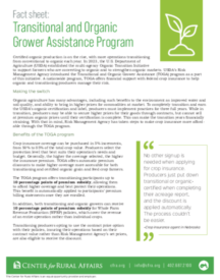Certified organic production is on the rise, with more operations transitioning from conventional to organic each year. In 2023, the U.S. Department of Agriculture (USDA) established the multi-agency Organic Transition Initiative to support farmers who are converting to organic and to strengthen organic markets. USDA’s Risk Management Agency introduced the Transitional and Organic Grower Assistance (TOGA) program as a part of this initiative. A nationwide program, TOGA offers financial support with federal crop insurance to help organic and transitioning producers manage their risk.
Making the switch
Organic agriculture has many advantages, including such benefits to the environment as improved water and soil quality, and ability to bring in higher prices for commodities at market. To completely transition and earn the USDA’s organic certification and label, producers must implement practices for three full years. While in transition, producers may be able to secure higher prices for their goods through contracts, but cannot sell at premium organic prices until their certification is complete. This can make the transition years financially straining. With that in mind, Risk Management Agency has taken steps to make crop insurance more affordable through the TOGA program.


